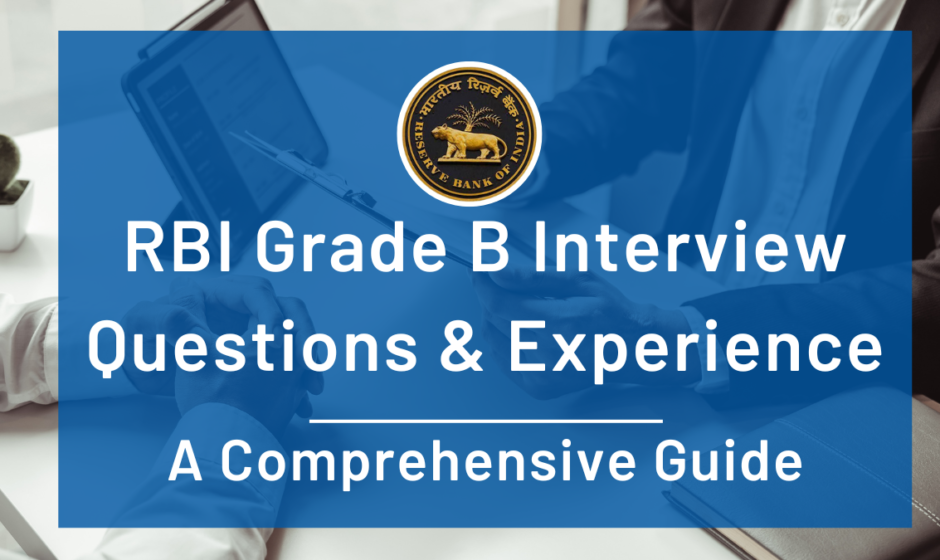The Reserve Bank of India (RBI) Grade B examination is one of the most prestigious exams in India. After clearing the preliminary and main exams, candidates are invited for the final phase – the interview. This stage plays a vital role in determining whether you’ll secure the coveted post of an RBI Grade B officer. Preparing for the RBI Grade B interview requires a mix of technical knowledge, confidence, and the ability to present yourself effectively.
Here’s a comprehensive guide to help you ace the RBI Grade B Interview 2025.
Understand the Interview Process
The interview panel typically consists of senior officials from RBI and experts from banking and financial sectors. The purpose is to assess your:
Knowledge of banking, finance, and the economy.
Analytical skills.
Problem-solving abilities.
Communication skills.
Personality and confidence.
Interviews usually last 20–30 minutes, during which the panel asks questions about your background, RBI’s functions, and current economic issues.
Step-by-Step Preparation Guide
1. Know the RBI Inside Out
Understanding the organization is crucial. Research the RBI’s functions, policies, and initiatives. Focus on:
Monetary policy framework.
RBI’s role in regulating banks.
Recent RBI announcements and their implications.
Economic reports like the Monetary Policy Report and Financial Stability Report.
2. Stay Updated with Current Affairs
The RBI interview often includes questions about current economic and financial news. To prepare:
Read newspapers like The Hindu, The Economic Times, or Business Standard daily.
Follow RBI’s official website for press releases.
Track global economic trends, especially those impacting India.
3. Review Your Application Form
The interview panel often refers to details in your application. Be prepared to:
Explain your educational background.
Justify gaps in education or employment, if any.
Discuss your hobbies and extracurricular activities.
4. Brush Up on Technical Knowledge
Revise key topics related to banking and finance, such as:
Inflation and its control measures.
GDP, fiscal deficit, and current account deficit.
Types of banking risks (credit, market, operational).
Basic concepts of financial markets (bonds, equities, derivatives).
5. Practice Mock Interviews
Mock interviews simulate the actual process and help you identify areas of improvement. Focus on:
Maintaining good posture and eye contact.
Answering questions concisely.
Avoiding filler words like “um” or “uh.” Record your practice sessions to review and refine your answers.
6. Work on Communication Skills
Clear communication is essential in interviews. To improve:
Speak slowly and clearly.
Practice explaining complex concepts in simple language.
Read aloud to improve your pronunciation and fluency.
7. Prepare for Common Questions
Here are a few frequently asked questions:
Why do you want to join RBI?
How does monetary policy affect the economy?
Explain the difference between fiscal and monetary policy.
What are the challenges facing the Indian economy today?
8. Stay Confident and Composed
Confidence can make a huge difference. During the interview:
Stay calm, even if you don’t know an answer. Politely admit it and mention how you would find the solution.
Keep a positive attitude and smile when appropriate.
Avoid interrupting the panelists.
Do’s and Don’ts for the RBI Grade B Interview
Do’s:
Dress formally and maintain a neat appearance.
Arrive at the venue on time.
Carry all required documents, neatly arranged in a folder.
Don’ts:
Don’t bluff if you don’t know the answer.
Avoid giving one-word answers; elaborate where necessary.
Don’t argue with the panelists.
Key Takeaway
Preparing for the RBI Grade B interview requires consistent effort, deep knowledge, and the ability to present yourself effectively. With the right preparation and mindset, you can confidently clear this stage and take a step closer to joining the RBI.
How to Prepare for RBI Grade B Exam 2025
The RBI Grade B Exam is a gateway to one of the most prestigious jobs in India’s banking sector. It involves three phases:
Preliminary Exam (Phase I)
Main Exam (Phase II)
Interview
Here’s a detailed preparation guide for all three stages.
Step 1: Understand the Exam Pattern and Syllabus
Phase I: Preliminary Exam
The Phase I exam is objective and includes:
General Awareness: Banking, finance, and current affairs.
English Language: Grammar, comprehension, and vocabulary.
Quantitative Aptitude: Simplification, data interpretation, and arithmetic.
Reasoning Ability: Puzzles, seating arrangements, and logical reasoning.
Phase II: Main Exam
Phase II includes both objective and descriptive questions:
Economic and Social Issues (ESI): Indian economy, poverty, and social issues.
Finance and Management (F&M): Financial markets, accounting, and HR management.
English (Descriptive): Essay writing, précis, and comprehension.
Interview
The final stage involves a personal interview to assess your overall suitability for the role.
Step 2: Create a Study Plan
Daily Schedule
Allocate 2–3 hours daily for Phase I subjects.
Dedicate 4–5 hours for Phase II subjects closer to the exam.
Weekly Goals
Cover one subject comprehensively each week.
Revise previously studied topics every weekend.
Step 3: Subject-Wise Preparation Tips
1. General Awareness
Read newspapers daily.
Refer to magazines like Pratiyogita Darpan for static GK.
Study RBI’s annual reports and economic surveys.
2. English Language
Practice reading comprehension from previous papers.
Brush up on grammar rules and vocabulary.
Write essays on current topics to improve your writing skills.
3. Quantitative Aptitude
Focus on speed and accuracy.
Practice topics like time & work, profit & loss, and data interpretation.
Use books like Quantitative Aptitude by R.S. Aggarwal.
4. Reasoning Ability
Solve puzzles and seating arrangement questions regularly.
Focus on high-weightage topics like syllogisms and coding-decoding.
Practice from RBI Grade B mock test series.
5. Economic and Social Issues
Understand topics like inflation, poverty, and economic growth.
Use Indian Economy by Ramesh Singh as a reference.
Follow government schemes and policies.
6. Finance and Management
Learn about the Indian financial system and risk management.
Use Management by Stephen P. Robbins for HR topics.
Study case studies to understand practical applications.
Step 4: Practice Mock Tests
Mock tests help you:
Get familiar with the exam pattern.
Identify strengths and weaknesses.
Improve time management.
Join a reputed online platform that offers RBI-specific mock tests.
Step 5: Revise and Consolidate
Regular revision is essential to retain information.
Create concise notes for last-minute revision.
Use flashcards for formulas and key terms.
Additional Tips
Stay consistent with your preparation.
Take short breaks to avoid burnout.
Focus on health and ensure you get enough sleep.
Conclusion
Preparing for the RBI Grade B Exam 2025 requires a strategic approach, time management, and regular practice. By following a structured plan and staying committed, you can significantly increase your chances of success. Stay confident and trust in your preparation!
Read more blogs.



